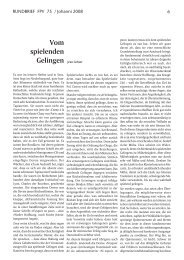Bernhard Hauser: Spielen und Lernen der 4
Bernhard Hauser: Spielen und Lernen der 4
Bernhard Hauser: Spielen und Lernen der 4
Sie wollen auch ein ePaper? Erhöhen Sie die Reichweite Ihrer Titel.
YUMPU macht aus Druck-PDFs automatisch weboptimierte ePaper, die Google liebt.
Piaget, J. (1975): Nachahmung, Spiel <strong>und</strong> Traum. Stuttgart. (zuerst 1959).<br />
Robinson, C.C.R. et al. (2003). Sequential transition patterns of preschoolers’ social interactions<br />
during child-initiated play: Is parallel-aware play a bidirectional bridge to other<br />
play states? Early Childhood Research Quarterly, 18, 3-21.<br />
Roth, G. (2001). Fühlen, Denken, Handeln. Wie das Gehirn unser Verhalten steuert. Frankfurt<br />
a. M.: Suhrkamp.<br />
Ryan, R.M.; Mims, V. & Koestner, R. (1983): Relation of Reward Contingency and Interpersonal<br />
Context to Intrinsic Motivation: A Review and Test Using Cognitive Evaluation<br />
Theory. Journal of Personality and Social Psychology, 45, 736-750.<br />
Saltz, E. & Johnson, J. (1974): Training for thematic-fantasy play in culturally disadvantaged<br />
children. Journal of Educational Psychology, 66, 623-630.<br />
Sanchez-Martin, J.R. et al. (2000). Relating testosterone levels and free play social behavior<br />
in male and female preschool children. Psychoneuroendocrinology, 25, 773-783.<br />
Scheuerl, H. (1979/1994): Das Spiel. Untersuchungen über sein Wesen, seine pädagogischen<br />
Möglichkeiten <strong>und</strong> Grenzen. Weinheim.<br />
Schiefele, U. & Schreyer, I. (1994): Intrinsische Lernmotivation <strong>und</strong> <strong>Lernen</strong>. Ein Überblick<br />
zu Ergebnissen <strong>der</strong> Forschung. Zeitschrift für Pädagogische Psychologie, 8, 1-13.<br />
Schindler,P.J.; Moely, B.E. & Frank, A.L. (1987): Time in day care and social participation<br />
of young children. Developmental Psychology, 23, 255-261.<br />
Schwartzmann, H.B. (1978): Transformations: The anthropology of children’s play. New<br />
York: Plenum.<br />
Schwartzmann, H.B. (1984): Imaginative play: Deficit or difference? In: Yawkey, T. & Pellegrini,<br />
A. (Eds.): Child’s play: Developmental and applied. Hillsdale, N.J.: Erlbaum,<br />
49-62.<br />
Scott E. & Panksepp, J. (2003). Rough-and-Tumble Play in Human Children. Aggressive<br />
Behavior, 29, 539-551.<br />
Smilanski, S. (1968). The effect of sociodramatic play on disadvantaged preschool Children.<br />
New York: Wiley.<br />
Smilanski, S. (1978). Wirkungen des sozialen Rollenspiels auf benachteiligte Vorschulkin<strong>der</strong>.<br />
In: Flitner, A. (Hg.): Das Kin<strong>der</strong>spiel. München: Piper (4. Aufl. ), 184-202.<br />
Smith, P. & Dodsworth, C. (1978): Social class differences in the fantasy play of preschool<br />
chil<strong>der</strong>n. The Journal of Genetic Psychology, 133, 183-190.<br />
Sodian, B. (1998). Theorien <strong>der</strong> kognitiven Entwicklung. In H. Keller (Hrsg.): Lehrbuch<br />
Entwicklungspsychologie; S. 147-169. Bern: Hans Huber.<br />
Spychiger, M.B. (1999). Macht Musik wirklich klug? Schweizer Musikzeitung, Nr. 6. S. 5-9.<br />
Spychiger, M.; Oser, F.; Hascher, T. & Mahler, F. (1999): Entwicklung einer Fehlerkultur in<br />
<strong>der</strong> Schule. In: Althof, W. (Hrsg.; 1999): Fehlerwelten – vom Fehlermachen <strong>und</strong> <strong>Lernen</strong><br />
aus Fehlern. Opladen: Leske & Budrich, S. 43-70.<br />
Stadelmann, W. (2001). <strong>Lernen</strong> aus <strong>der</strong> Sicht <strong>der</strong> Neuropsychologie. Luzern, unveröffentl.<br />
Referatsskript <strong>der</strong> Weiterbildung <strong>der</strong> LEBE Emmental (7. 11. 01).<br />
Stamm, M. (1998): Frühlesen <strong>und</strong> Frührechnen als soziale Tatsachen? Aarau: Institut für Bildungs-<br />
<strong>und</strong> Forschungsfragen im Schulbereich.<br />
Stern, E. (2001). Intelligenz, Wissen, Transfer <strong>und</strong> <strong>der</strong> Umgang mit Zeichensystemen. In:<br />
Stern, E. & Guthke, J. (Hrsg.). Perspektiven <strong>der</strong> Intelligenzforschung. Berlin: Pabst<br />
Science Publishers, 163-204.<br />
Sutton-Smith, B. (1978): Die Dialektik des Spiels. Schorndorf: Hofmann<br />
Tizard, B., Philps, J. & Plewis, I. (1976). I. Play in preschool centres. II. Effects on play of<br />
the child’s social class and the educational orientation of the centre. Journal of Child<br />
Psychology and Psychiatry, 17, 265-274.<br />
- 34 -




